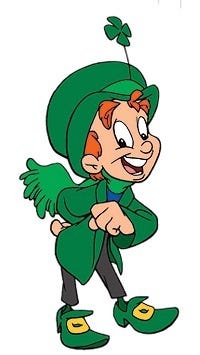Leprechauns make mayhem. Wizards make a raucous.
Magically delicious.
I mean, they’re frosted. So of course they’re going to be fucking delicious.
But magical, too? Count this kid in.
Fun fact: Lucky the Leprechaun has an alias. His drinking buddies supposedly call him “Sir Charms.” (That’s like believing that other people gave Sting his nickname.) [1]
Here’s another sugary bit of trivia: In 1975 the maker of Lucky Charms, General Mills, replaced Lucky with “Waldo the Wizard” in the New England market. Crazy, right?
For starters, how is a leprechaun not a good fit for Boston and its environs?
…Irish? Check.
…Short temper? Check.
…Funny accent? Check.
…Terrible driver? Double check.
Modern leprechauns are obsessed with luck. They want it, they grant it, they “crave it fortnightly, smart ass.”
If consultants know anything, they know frameworks, so I won’t reinvent the wheel. When McKinsey starts consulting for a Top 5 fantasy world, they typically analyze the situation using the patented 5M framework. Let’s take a look:
1. (Mis)fortune
The leprechauns of the original legends were more focused on downside risk (bad luck) than lottery-esque windfalls. The word “leprechaun” derives from the Irish leath bhrogan, meaning “shoemaker.” These wee men save more money than a scared German, and they’re paranoid that humans are going to purloin their hard-earned treasure. [2]
(Aside: How messed up is the idea that rainbows exist to help you steal a leprechaun’s rainy day fund?)
Wizards, on the other hand, aren’t haunted by uncertainty. They embrace it.
Wizards create their own luck. Like a good general they select when to fight, and they choose the terrain. Like an entrepreneur, they take base inputs and create things of higher value. Wizards acknowledge that bad things can happen, and sometimes they see darkness on the horizon before the society that inhabits their same plane of fantastical existence. But wizards’ lives are not ruled by fear.
Have a suicidal quest in mind? They’re in. [3]
World about to end? No prob.
The old guys with the pointy hats are cautiously optimistic that the good guys are going to have a Rocky moment before the final bell.
Nor do wizards chalk up great accomplishments to luck. While it’s never clear what actually constitutes work for a wizard, it seems from movies and books that they’re willing to endure meager living standards for decades in order to realize their life’s purpose.
You don’t see wizards lamenting a lack of talent. A fictional wise man once said, “It is our choices, Harry, that show what we truly are, far more than our abilities.”
2. Mark (i.e. target)
Leprechauns seem to wander around, stumbling into interesting situations, risks, and opportunities at random.
Wizards are nothing if not intentional. Not to mention great at planning.
3. Motives
One thing you can say about leprechauns is that they’re focused. But so are meth addicts. What do leprechauns plan to do with all of that gold anyway? Corner the four-leaf clover market? Move to Boca?
Wizards on the other hand tend to have missions larger than themselves. I’m not a big fantasy guy. But from what I can gather, wizards gravitate toward one of two life purposes: dominating the universe or fighting other magical creatures (sometimes wizards also) who want to… wait for it… dominate the universe.
4. Magick [4]
If you catch a leprechaun, the little guy will give you three wishes in exchange for his freedom. They’re clever tricksters and disappear quickly if you take your eye off of them, though. Then again, same with kids. So even if leprechauns are technically fairies, they just aren’t really that magical on a day-to-day basis.
In contrast, wizards probably forget how to do anything that doesn’t involve magic. [5] Like an entrepreneur, they transform inputs into valuable outputs on a regular basis. It’s their stock in trade.
5. Mayhem
Schoolteachers are fond of telling kids that leprechauns “might” make a mess at school on St. Patrick’s Day (or rather, St. Patrick’s Eve?).
Let’s face it. This is completely preposterous even for a kids story. If the little old men are making messes as a joke, it’s lacking, well, humor for starters. If they’re looking to get back at humans for years of kidnap and larceny, then why do they stop at flinging bright green color-safe paint around the art room? Why not just break a few windows or pour sugar in car gas tanks? And why only one day a year? Unlike holiday gift-giving, mayhem knows no calendar.
Anyway, supposedly leprechauns make mayhem that is trivial and boring. Then they run away. Bit passive aggressive, no?
Wizards are sort of all or nothing. Either they want to kill everyone, or they want everyone to live in peace. They’ve got more important things to do than make a mess in a random villager’s house during the night.
They’re direct. They pick the biggest, baddest guy in the prison yard and make him their bitch.
Conclusion
If you’re shriveled, small, fearful, mercurial, and antagonistic to everyone, then you’re a leprechaun. Most people are leprechauns.
Or be a wizard. Do something that matters. Plan, plod. Turn nothing into something. Have some guts.
Leprechauns make mayhem. Wizards make a raucous.
If you enjoyed this post, please make a donation to the Leprechaun Anti-Defamation Syndicate. LADS is a registered 501(c)(3) organization that works to reverse harmful wee stereotypes.
[1] From Wikipedia:
The mascot of Lucky Charms, created in 1963, is Lucky the Leprechaun, also known as Sir Charms, and originally called L.C. Leprechaun.
Supposedly Sting got his nickname for wearing black and yellow while playing for the Phoenix Jazzmen. I think he made it up one night drinking with his mates. “C’mon, guys! Seriously, call me ‘Sting’ now.”
[2] If humans are so bad at finding leprechauns, who’s buying all the shoes? Other leprechauns who, by the way, also make shoes? WTF.
[3] This kind of attitude is distinct from an obsession with or assumption of good luck.
[4] This spelling is used solely due to Jimmy Page’s affinity for the same.
[5] It seems like there’s a magical way to do everything, which is kind of ridiculous. Someone would have to discover all of these spells, but how would they figure out the chocolate chip cookie incantation? Or anything else for that matter?
More importantly, when there’s a spell for everything, I wonder if there’s a form of mental-physical tongue-tying with which wizards are afflicted — just like someone who speaks multiple languages often intermingles them by accident.




Recent Comments